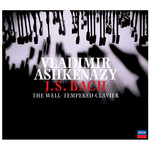
MARBECKS COLLECTABLE: Bach: The Well-Tempered Clavier, Books 1 & 2
 $45.00
Low Stock
add to cart
$45.00
Low Stock
add to cart
J. S. BACH
MARBECKS COLLECTABLE: Bach: The Well-Tempered Clavier, Books 1 & 2
Vladimir Ashkenazy (piano)
[ Decca / 3 CD ]
Release Date: Thursday 13 April 2006
Should this item be out of stock at the time of your order, we would expect to be able to supply it to you within 4 - 7 business days.
MARBECKS STAFF RECORDING OF THE YEAR 2006 - 'He brings a rewarding limpidity and lucidity of thought and texture to Bach's music'
(BBC Music Magazine Disc of the Month May 2006)
"Directness, articulation and absolute trust in the music's own poetic strengths, careful to use the piano as the medium through which to convey the music's essence rather than attempting to inflate its grandeur to match the power and range of the instrument"
(The Guardian)
MARBECKS STAFF RECORDING OF THE YEAR 2006
'He brings a rewarding limpidity and lucidity of thought and texture to Bach's music'
(BBC Music Magazine Disc of the Month May 2006)
"Though he has never been regarded as a Bach pianist, Vladimir Ashkenazy's set of the 48 Preludes and Fugues merits a place alongside the finest versions of this much-recorded cycle, those by interpreters such as Edwin Fischer, Sviatoslav Richter and Glenn Gould. Of those, Ashkenazy's approach is closest to that of Fischer in his directness, articulation and absolute trust in the music's own poetic strengths, and he is careful to use the piano as the medium through which to convey the music's essence, rather than, as some pianists do, attempting to inflate its grandeur to match the power and range of the instrument. Of course, not everything Ashkenazy does will be to all tastes - his choice of tempo can be on the fast side, and sometimes his determination to keep textures transparent verges on gruffness - but there is so much common sense here that hardly matters." (Guardian)***** 5 stars out of 5
Both books of Bach's 48 preludes and fugues.
Vladimir Ashkenazy's interpretation of the great foundation-stone of western music.
Ashkenazy's first Bach recording since the D minor concerto with the LSO in 1965.
Despite more than 40 years recording exclusively for Decca J.S. Bach is something of a new composer for Ashkenazy in the studio. He has only recorded Bach once before, and that was in 1965 when he recorded the D minor Concerto, BWV 1052, as part of a disc that included Chopin's F minor Concerto; this was with the London Symphony Orchestra and David Zinman.
It might be difficult for us to imagine today that a young Russian music student in the late 1940s and 1950s, would have had little exposure to the music of Bach. This was a time when the Russian system of music teaching placed great emphasis on Russian romantic piano literature. Much of the great keyboard literature by figures such as Bach, Mozart and Beethoven was simply unknown.
Ashkenazy first visited the West when he was an entrant in the Queen Elisabeth Competition in Brussels in 1956 and was unanimously awarded First Prize. This visit exposed him to a wider range of music than he would have experienced in Russia at that time.
A year later, in 1957, when Ashkenazy was just twenty many Russians were introduced to the music of Bach with a series of concerts in major Russian cities by a young pianist called Glenn Gould created a sensation with his recitals.
Bach's Well-Tempered Clavier is a collection of two sets of twenty-four Preludes and Fugues which, starting with C major and ending with B minor, works through all the major and minor keys in ascending chromatic order. Described by the pianist-composer Hans von Bülow (1830-94) as "the Old Testament of piano music", the sheer scale of variety and expression throughout these pieces is astonishing and there are no two preludes or fugues which are alike. In this collection of pieces Bach also employs some keys which do not appear anywhere else in his output.
The overall title of the work and the meaning of "well-tempered" refers to the system of tuning fixed-pitch instruments so that the player can perform in the entire range of keys within the chromatic scale so that all sounded in tune.
Bach does not specify precisely which instrument is to be used and simply indicates "clavier". The keyboard instruments in regular use in his lifetime were the harpsichord, clavichord and organ - the piano was very much still in its infancy during his lifetime - and while any of these instruments may be used the modern piano is the one keyboard instrument which can truly offer the widest range of possibilities in range of articulation and dynamics, style and expression, all of which are wonderfully demonstrated in this new recording by Vladimir Ashkenazy.
Ashkenazy's exclusive association with DECCA as a pianist now spans more than 40 years, and during that time he has built-up a huge discography which embraces much of the major piano literature from Mozart and Beethoven through to composers such as Scriabin, Rachmaninov, Prokofiev and Shostakovich. While the majority of Ashkenazy's time nowadays is devoted to conducting he still gives a limited number of recitals each season, and despite his incredibly busy schedule he still continues to explore new repertory.
In the late 1990s Ashkenazy committed Shostakovich's 24 Preludes and Fugues to disc - a critically acclaimed recording that won several important international awards.



